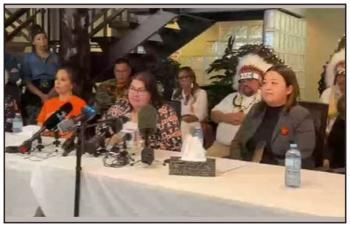Image Caption
Summary
Local Journalism Initiative Reporter
Windspeaker.com
Warning: This story contains information that may be distressing to readers.
Ninety-three unmarked graves have been identified through ground penetrating radar (GPR) in the cemetery at Beauval Indian residential school site in Saskatchewan.
“Ninety-three young boys and girls (who) were someone’s children, grandchildren. (They) would have been someone’s mushum, kokum, mom and dad. Could have been. Robbed. Robbed from their lives…. Possible kokums and mushums dead. That’s a travesty in itself,” said Chief Bobby Cameron of the Federation of Sovereign Indigenous Nations.
Cameron’s comments followed two weeks after an initial announcement of 83 graves were identified through a two-year GPR search. That increase of 10 was confirmed by an archaeologist when he placed flags to mark each anomaly. The lengths of the potential graves indicate 79 children and 14 infants.
The findings are expected to impact 16 communities in the northwest, both First Nations and Métis, which had children attend the school.
According to a University of Regina publication, Beauval operated as a boarding school from 1897 to 1969 under the Roman Catholic Mission. The federal government took control of the operation in 1969. It officially closed in 1983. Initially located in Île-à-la-Crosse, the school was moved to Lac La Plonge in 1906. La Plonge is part of the English River First Nation.
The cemetery was used by the residential school and its staff until the early 1980s. After that it became a community cemetery.
Time was given after the early August initial findings to allow for ceremony to help survivors and families deal with the “heartbreaking and devastating” news and to visit the graves, said English River First Nation Chief Jenny Wolverine.
“This is not a final number. It breaks my heart that there are likely more, or even that there is even one,” said Wolverine.
Wolverine and Cameron were joined at the English River Business Complex south of Saskatoon on Aug. 29 by members of the Meadow Lake Tribal Council, as well as Metis Nation-Saskatchewan Vice President Michelle LeClair and Saskatchewan Treaty Commissioner Mary Culbertson.
“The last few weeks, indeed, the last few months have been an emotional rollercoaster for our community,” said Wolverine.
Wolverine did not attend residential school, but both her grandparents and parents did.
“While the schools may be closed, the impacts affect us today through the loss of language, loss of culture, and loss of life,” she said.
Dawn McIntyre, an intergenerational survivor of Beauval, coordinated the GPR search. She worked with a team of Elders, elected leaders, community members and GPR specialists.
The initial area was searched because of stories told by survivors.
The search of the school grounds is next, said McIntyre, and will continue to be guided by stories of survivors.
Records will be used to help identify the children. Presently the National Centre for Truth and Reconciliation has the names of 52 children who passed away at the school. The list includes mostly approximate dates.
“If we can find out as much information from the archives as possible, (we) would only consider exhumation as a last resort,” said McIntyre.
LeClair said Métis students attended Beauval. She called on the federal government to release all records so communities would be able to “identify our own children.”
Both Culbertson and Meadow Lake Tribal Council Vice-Chief Richard Durocher called out deniers of Indian residential schools.
“There are people who will... deny and try to show up with shovels when these announcements are made, because they want to prove there was nothing done wrong,” said Culbertson. “(But) these are ugly truths that we have to come to grips with in this country. Whether we like it or not, this is happening.”
An emotional Wolverine said communities needed support from both the federal and Saskatchewan governments to allow for a holistic approach for healing physically, mentally, spiritually, and emotionally.
“Governments can help with all of that,” she said. “We have heard, ‘I am sorry.’ Now we need to see action from that.”
A call was made for funding for healing centres in the impacted communities.
Culbertson said governments need to make amends for broken treaty promises.
“These governments need to do the right thing. They need to step up because these stories aren’t going to stop coming. These tears aren’t going to stop being shed,” she said.
Local Journalism Initiative Reporters are supported by a financial contribution made by the Government of Canada.

